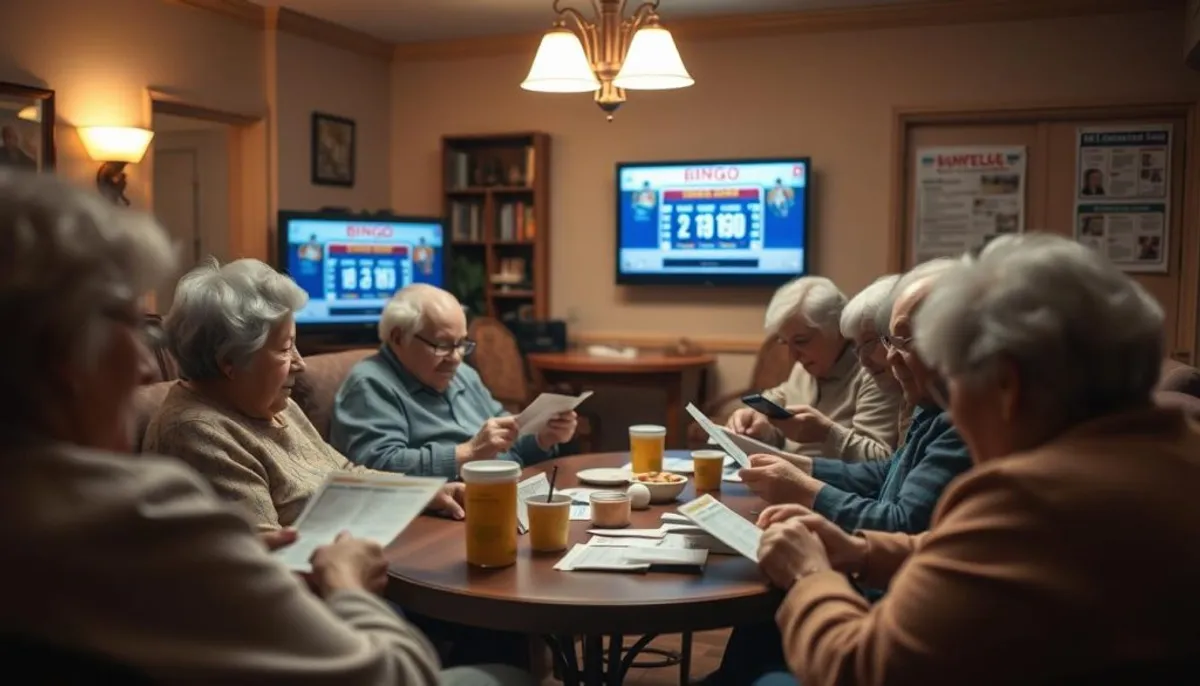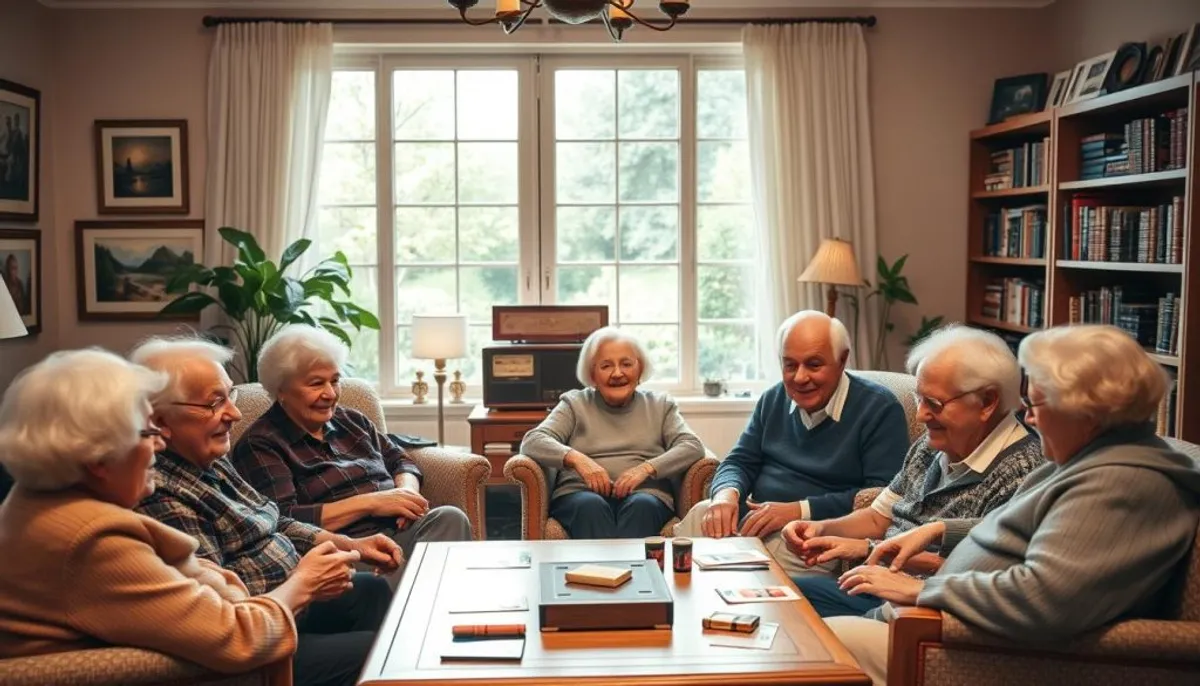The general knowledge quizzes for seniors provide enriching entertainment while stimulating memory. These captivating games cover a variety of topics, from history to geography, including arts and literature.
For example, a question might focus on the French Revolution of 1789 or on Victor Hugo, the author of "Les Misérables." Other popular topics include capitals like Rome or Madrid, famous painters such as Van Gogh, or scientific discoveries like penicillin by Alexander Fleming.

These intellectually stimulating activities are valuable for seniors. They not only revive knowledge but also help acquire new information. A medium-difficulty quiz on Culture Quizz generally achieves a 65% correct answer rate, providing an appropriate challenge.
The general knowledge questions for seniors are designed to be accessible and engaging. They encourage interaction and stimulate memory, thus contributing to the cognitive well-being of seniors. This playful approach to knowledge transforms learning into a moment of shared enjoyment.
The Importance of Cultural Quizzes in Stimulating Seniors' Memory
Quizzes for seniors have proven crucial for keeping the mind sharp. These intellectual activities bring numerous benefits to the mental health of older adults. They contribute to their overall well-being.
The Cognitive Benefits of General Knowledge Games
General knowledge games actively stimulate the brain. A study from the University of Toronto shows that they enhance the cognitive abilities of seniors. Quizzes, in particular, engage memory, reasoning, and decision-making.
How Intellectual Stimulation Helps Prevent Cognitive Decline
Regular practice of cognitive activities is essential to prevent mental decline. According to INSERM, engaging in intellectual hobbies twice a week reduces the risk of neurodegenerative diseases. Quizzes play a key role in maintaining cognitive functions in the face of aging.
The Social Aspect of Group Cultural Activities
Group cultural quizzes offer more than just intellectual stimulation. They promote social interaction, which is essential for the well-being of seniors. 60% of seniors report that these activities enrich their quality of life. Book clubs and social discussions improve self-confidence and communication skills by 25%.
| Activity | Benefit | Percentage Improvement |
|---|---|---|
| Memory Games | Reduction of the risk of neurodegenerative diseases | 30-50% |
| Book Clubs | Increase in analytical skills | 20% |
| Image Association Exercises | Improvement of visual memory | 40% |
Organization and Preparation of Quiz Sessions
Offering quiz sessions to seniors is an effective strategy to stimulate their brains. Careful organization is crucial to ensure the success of these sharing moments.
The Necessary Materials for Hosting a Quiz
To organize a general knowledge quiz, it is recommended to prepare:
- A variety of question cards
- A board to record scores
- A projector or printed sheets to display questions
- Pens and paper for participants
The Ideal Space Setup
Creating a comfortable and accessible environment is essential:
- Arrange tables and chairs in a U-shape or circle
- Ensure good lighting
- Check that everyone can see the screen or displayed questions
The Rules and Flow of a Session
Establishing clear rules is essential for making the quiz enjoyable for everyone:
- Explain the flow and duration of the session
- Adapt the pace and difficulty of the questions to the participants' abilities
- Plan for regular breaks
- Encourage everyone's participation in a supportive atmosphere
By applying these tips, you will be able to create captivating cultural quiz sessions. These sessions will promote exchanges and stimulate the intelligence of seniors.
General Knowledge Questions for Seniors: Popular Themes
Quizzes for seniors offer a range of captivating themes, stimulating general knowledge and awakening memories. History and traditions play a predominant role, captivating the interest of older participants.
Significant historical events are particularly appreciated. The fall of the Berlin Wall in 1989 and the awarding of the first Nobel Prize to Marie Curie in 1903 are examples that resonate with seniors.
Film and literature are also popular themes. Questions about classic works like "Little Women" and famous adaptations, such as "The Lion King" on Broadway, stimulate cultural memory.
Quizzes also cover scientific and geographical topics. Knowledge of capitals, like New Delhi for India, and planetary characteristics, such as Mercury being the smallest planet in the solar system, allow for a mental journey.
| Theme | Example Question | Popularity |
|---|---|---|
| History | In what year did the Berlin Wall fall? | Very High |
| Arts and Culture | What is the real name of the Mona Lisa? | High |
| Geography | What is the capital of India? | Medium |
| Science | What is the largest organ in the human body? | Medium |
These varied themes in quizzes for seniors not only promote cognitive stimulation but also encourage enriching exchanges among participants. These exchanges strengthen social bonds and the sense of belonging to a common culture.
The Different Formats of Questions Adapted for Seniors
Memory games and intellectual hobbies play a crucial role in entertaining seniors, particularly through popular themes like manga and anime. They stimulate their cognitive abilities while providing an enjoyable experience. Several question formats are available, each tailored to specific needs.
Multiple Choice Questions
This format is particularly suitable for seniors. It facilitates their participation by allowing them to test their knowledge without the pressure of having to formulate a complete answer. Multiple choice questions are appreciated in games like bingo, created in the 16th century and still popular today.
Open Questions and Riddles
Open questions and riddles further stimulate thought and memory. They are often included in activity kits provided by various associations for nursing homes. These activities encourage cultural exchanges and strengthen social ties among residents.
Visual and Auditory Questions
The integration of visual and auditory elements in quizzes enriches the experience. Period images or musical excerpts engage different types of memory, making the game more immersive. Applications like EDITH offer over 30 varied games, adapted for individuals with cognitive impairments.

| Question Format | Advantages | Example Applications |
|---|---|---|
| Multiple Choice | Easy to understand, reduces stress | Bingo, cultural quizzes |
| Open Questions | Stimulates thought, encourages exchanges | Riddles, word games |
| Visual and Auditory | Engages different types of memory | EDITH, Word Search |
By varying these formats, facilitators can maintain participants' interest and adapt to their preferences. The intellectual hobbies designed in this way effectively contribute to the well-being and cognitive stimulation of seniors.
History and Traditions: Seniors' Favorite Subjects
Seniors are passionate about history and traditions. These subjects, rich in memories and knowledge, stimulate their memory. They also promote exchanges among participants.
Significant Historical Events
Seniors are captivated by major historical events. A question like "In what year did the French Revolution begin?" (Answer: 1789) awakens their memories. Events from the 20th century, experienced by many, are particularly appreciated.
French Customs and Traditions
Regional and national traditions offer a wealth of questions. They allow for sharing experiences and rediscovering French cultural heritage.
Famous Figures of the 20th Century
Seniors are fascinated by iconic figures in politics, arts, or sciences. These questions stimulate their knowledge and encourage enriching discussions. Additionally, they can watch Culturebox online to explore more cultural content.
| Profile of Senior Participants | Number | Percentage |
|---|---|---|
| Former Education Professionals | 83 | 40% |
| Medical Professions | 17 | 8% |
| School Directors/Administrators | 10 | 5% |
| Participants Aged 63 to 85 | 54 | 26% |
| Explicitly Mentioned Retirees | 14 | 7% |
This diversity of profiles enriches exchanges during quizzes on history and traditions. It offers varied perspectives on past events and French customs.
Arts, Music, and Cinema of Yesterday and Today
Quizzes for seniors provide stimulating entertainment, diving into the world of arts, music, and cinema. These subjects, filled with memories and emotions, offer an excellent way to entertain seniors. They also stimulate cognition, thus promoting mental health.
Statistics show a marked interest in these cultural domains. For example, 244 quizzes on classical music were played in a single day. Additionally, 381 quizzes on cinema and songs were completed in six days. These data illustrate the lasting appeal of these subjects among seniors.

A well-thought-out quiz can address questions about literary classics, artistic movements, popular songs, and cult films. For instance, "Which American filmmaker directed the 'Godfather' trilogy?" (Answer: Francis Ford Coppola). These questions stimulate long-term memory and encourage interest in contemporary culture.
Artistic themes in quizzes for seniors also encourage intergenerational exchanges. They allow seniors to share their knowledge and experiences while discovering new aspects of current culture. This creates a bridge between generations, enriching the experience for all.
Geography and Travel as a Source of Questions
Geography and travel quizzes, along with a cultural quiz, provide an excellent opportunity to enrich seniors' knowledge. They encourage revisiting travel memories and exploring the world from home. These intellectual hobbies, based on these themes, are particularly valued for their ability to stimulate curiosity and foster exchanges among participants.
Capitals and Famous Monuments
Questions about capitals and iconic monuments are a staple of geography quizzes. For example, "What is the capital of Italy?" (Answer: Rome). These inquiries draw on knowledge accumulated over the years or during travels.
French Regional Specialties
Quizzes on culinary specialties of France stimulate both memory and senses. They allow participants to discover the unique flavors of different French regions. This type of question promotes the sharing of tasting experiences among participants.
Wonders of the World
Questions about the natural or architectural wonders of the world often captivate seniors. "What is the longest river in the world?" (Answer: The Nile) is an example of a question that can spark exciting discussions about world geography.
These varied geographical themes enrich general knowledge while offering a stimulating virtual journey for the mind. Seniors appreciate these cognitive activities that allow them to share their experiences and learn new things about the world around them.
Conclusion
General knowledge questions for seniors prove to be an essential tool for stimulating the cognitive abilities of older adults. These quizzes, far beyond mere entertainment, play a fundamental role. They help maintain intellectual vitality and prevent cognitive decline.
By offering a variety of themes and formats, these memory games adapt to everyone's tastes. Whether in history, arts, or geography, every senior finds a subject that attracts them. These activities also strengthen social bonds, crucial for the well-being of seniors.
Organizing these quizzes regularly, whether with family or in institutions, enriches the intellectual life of seniors. General knowledge questions are not just entertainment. They represent a major investment in the cognitive health of older adults.
RelatedRelated articles


